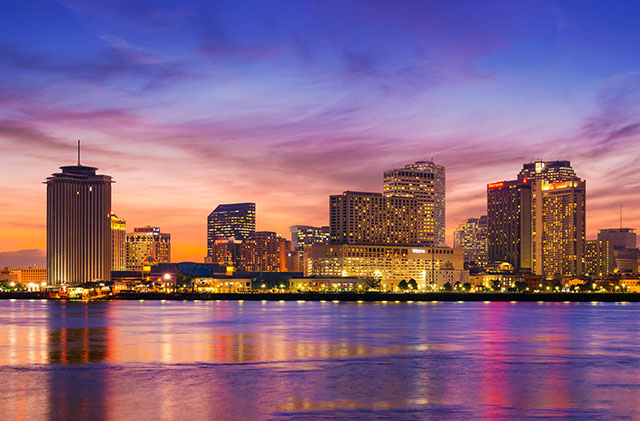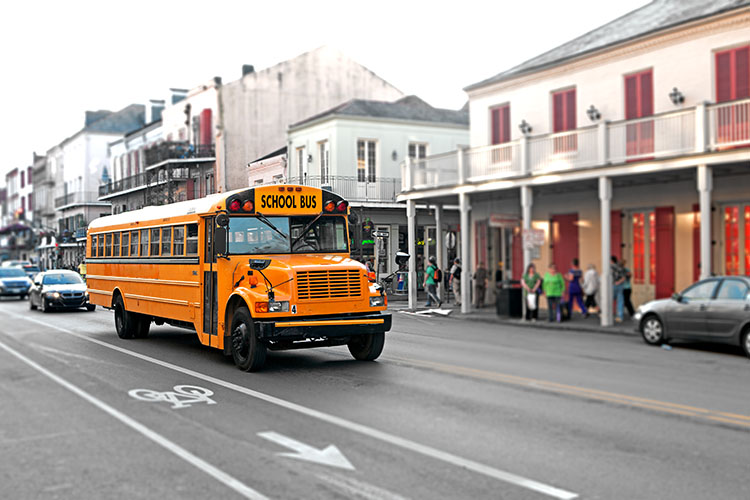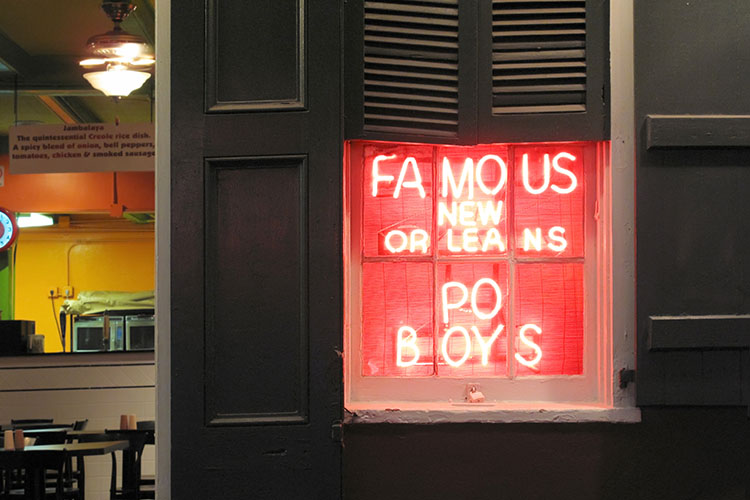
Living in New Orleans: 15 Things To Know
Louisiana
Thinking about living in New Orleans? We don’t blame you! Crescent City is one of the most vibrant places in the U.S., with thousands of tourists flocking there each year — and not just for Mardi Gras. New Orleans offers an affordable cost of living, access to good jobs, and a food and cultural scene unmatched by other cities. With Spanish, French, Creole, and Cajun influences in the music, culture, cuisine, and architecture, this is a city teeming with great experiences — offering residents an unparalleled experience.
| Planning a move to The Big Easy? Start by getting a quote from PODS. |

New Orleans is one of the most unique places in the U.S., with its distinctly French and Creole flair not found anywhere else.
New Orleans at a Glance
15 Things To Know About Living in New Orleans
So what’s it like living in New Orleans? Well, we’ve put together a list of 15 essential aspects to help you decide whether or not the Crescent City is right for you. From the New Orleans cost of living to pros and cons and even some of the best neighborhoods to check out, keep reading to find out more about life in The Big Easy.
1. New Orleans’ Cost of Living
The New Orleans cost of living score is 101.6, making it less than 2 percent more expensive than the U.S. average cost of living. The state of Louisiana has a cost of living score lower than New Orleans, as well, sitting at just 89.9, meaning you’ll pay less to live elsewhere in the state.
That being said, New Orleans’ cost of living is much lower than other large cities in the U.S. — like Chicago or Los Angeles — and you’re not missing out on any of the big-city amenities. And the average cost of groceries, housing, and utilities are all below the national average when living in New Orleans.
| Q: How much do you need to live comfortably in New Orleans? A: One adult without children will need to make around $41,000 each year before taxes. |
2. Salary Needed for Living in New Orleans
New Orleans has a variety of industries that you can find a great job in, including tourism, energy, and healthcare. As we mentioned above, the cost of living in New Orleans is just slightly higher than the national average. Depending on your situation, you’ll find that you may need different salaries in order to live comfortably.
- A family of four (two working adults and two children) will need about $96,000 before taxes to afford expenses.
- A young professional/student/retiree (i.e., person without dependents) should make about $41,000 before taxes.
- A couple (both working) without children will need about $58,000 before taxes to live comfortably.

Hearty, rich foods accented with the “holy trinity” of celery, peppers, and onions, give New Orleans one of the best food scenes in America.
3. Pros and Cons of Living in New Orleans
Pro: Amazing Food and Music Scenes
Is New Orleans a good place to live? Absolutely! And some of the first things you may think of when it comes to the benefits of living in New Orleans are the amazing food and live music scenes.
All those influences (Spanish, French, Creole, Cajun, pre-Columbian) come together to create one of the most diverse sets of restaurants you can find in a city. From shrimp gumbo, po’boys, crawfish, and shrimp etouffee — not to mention fried chicken, turtle, and alligator — there is no shortage of amazing food here. And if you like sweets, you're in luck, because the beignets are absolutely out of this world, especially when paired with a cafe au lait.
Jazz was also born in New Orleans, and you can expect to hear live music daily. Whether you stop into a cafe or bar to see a band, or you hear musicians on street corners, there’s no doubt that this city has music in its bones.
Pro: Lower Cost of Living
While there are cheaper places to live in Louisiana, the cost of living in New Orleans is low compared to other comparably sized cities. Plus, if you go to another city, you won’t get nearly the amount of art, music, food, and culture that you see on a daily basis living in New Orleans.Pro: Always Something To Do
As one of the liveliest cities in the country, it means there’s always something to do in New Orleans, LA. National and local musical acts abound, not to mention there are festivals almost every weekend. You can also easily check out City Park, which offers a way to enjoy nature right in the city and includes a botanical garden and museum of art.
| Q: Is New Orleans, LA, a good place to live? A: Lots of folks enjoy living in New Orleans because it’s a friendly, laid-back city that offers a lower cost of living and a vibrant cultural scene. |
Con: Heat and Humidity
The heat is a real disadvantage during the summer months. From June through August, it can get incredibly unbearable, especially if you aren’t used to this kind of weather. Another important tip to keep in mind is New Orleans was built near a lot of swamp country, so the humidity also soars in the summer. And because the city experiences a rainy season during these months, it’s also prone to hurricanes. Feeling hot and sticky is just a part of life during the summer.
Con: Lots of Bugs
The type of climate of New Orleans and where it was built means that there are lots of bugs. If you’re coming from a climate that’s drier or experiences cold winters, you may have to get used to the near-constant presence of some kind of insect (mosquitos and ants, for example), or worse, arachnids like the dangerous Brown Recluse spider that is endemic to New Orleans.
Con: Floods and Extreme Weather
New Orleans is in a hurricane zone and has experienced several harsh storms over the years — including Hurricane Katrina and Hurricane Ida. Hurricane season runs from June through November. And although the city isn’t always hit with damaging hurricanes, thanks to its position below sea level, it is prone to flooding. Because of extreme weather, the insurance on houses runs higher, as well, which is important to keep in mind for your budget.
| Q: Why are people moving out of New Orleans? A: The area tends to flood, and the damage brought by Hurricanes Katrina and Ida have resulted in rising insurance rates and housing shortages — which has led residents to look for housing elsewhere. |
4. New Orleans Housing Market
The average home value for a house in New Orleans is around $238,800; however, there was almost a 24 percent drop in home sales from June 2023 to June 2024. Experts believe this is due to high interest rates and high property insurance for homes.
There are a variety of housing styles throughout the city, thanks to historical influences. You’ll actually see a lot of different structures right next to each other, which is one of the reasons why it is so interesting to architectural enthusiasts. Examples of styles you’ll find throughout the city include:
- Single-story Creole cottages
- American townhouses
- Creole townhouses
- Greek Revival and Italianate cottages
- Shotgun houses
5. Apartments/Renting in New Orleans
The average monthly rental price for a one-bedroom apartment in New Orleans is around $1,375, and the average size of an apartment in the city is just under 900 square feet. Naturally, if you need a larger place, you’ll need to cough up more per month. According to RentCafe, the majority of apartments in New Orleans rent for between $700 and $1,500, and just slightly more households are classified as rentals than homes that are owned. These rental prices are still below the national average of around $1,750, though.
6. Best Places To Live in New Orleans
Abita Springs
If you’re looking for one of the best places for families in New Orleans, then consider finding a space in Abita Springs. This suburb is about an hour from Bourbon St., so if you’re looking for a spot that’s away from the bustle, this may be it. Here, your kids will receive a good education from the highly ranked St. Tammany Parish school district. You’ll also appreciate the Abita recreation center and fields that offer plenty of opportunities for the kids to stay active.
Metairie
One of the best places to retire in the country is the community of Metairie, which is located right along Lake Pontchartrain. The Metairie Country Club is one of the more popular places, where you can golf, enjoy the fitness room, or get out on the tennis/pickleball courts to keep active. This welcoming community also has all kinds of dining options, and it offers beautiful lakefront trails and a bird sanctuary at Lafreniere Park.
East Carrollton
If you’re a young professional, a student, or a single person, then you want to be in the mix of all the fun in the East Carrollton neighborhood of New Orleans. Here, you can easily hop on the NORTA bus or tram to get anywhere you want, including some amazing bars and restaurants like Cooter Brown’s Tavern. You’re also only blocks away from Audubon Park, where you can golf, walk the trails, or check out the zoo.
| Q: What are the benefits of living in New Orleans? A: The benefits of living in New Orleans include access to a diverse cultural and food scene, live music and festivals, and opportunities to explore the outdoors. |
7. Transportation Options in New Orleans, LA
With a walk score of 58, New Orleans is somewhat walkable. Once you get into specific neighborhoods, like the French Quarter and Marigny, though, that number skyrockets to 97 and 96, respectively. Overall, the city has made strides to improve both the pedestrian and biking experience. NORTA operates most of the public transportation in the city, and there are several ways you can get around NOLA without a car, including going for a ride on the iconic streetcars. The streetcars operate on four main lines that go out to popular neighborhoods, but you can also hop on a bus. Most bus lines run 24 hours, and you can use them to reach other areas outside of the main districts.
NORTA also has a ferry that can take you across the Mississippi River to Chalmette and Algiers to explore those fun NOLA neighborhoods. However, if you want to explore further outside the city, you’ll need a car.

Overall, the New Orleans school system has its shares of challenges, but there are quality schools to be found.
8. Schools and Higher Education Available in New Orleans
The public education system in New Orleans is in a challenging situation due to lack of funding and hurricane damage, but it is trying to improve. There are a variety of schools you can send children to, including public, private, charter, and magnet schools. Some well-ranked schools in New Orleans include:
- Benjamin Franklin High School
- Isidore Newman School
- The Willow School New Orleans
When it comes to higher education, Tulane University is a well-respected research university located right in New Orleans. The urban campus blends seamlessly into both the uptown and downtown campuses. You’ll also find more opportunities for university life at:
- Loyola University New Orleans
- Xavier University of Louisiana
- University of Holy Cross
9. The New Orleans Sports Scene is Electric
Although New Orleans is known for its support of music, art, and parties, they also love their sports teams with a fiery passion! The NFL’s New Orleans Saints call the Caesars Superdome home, and there’s also the NBA team, the New Orleans Pelicans, which were inaugurated in the 2002-03 season after moving from Charlotte, NC.
College schools like Tulane and even LSU (about an hour and a half away from New Orleans) also enjoy a lot of local support. You’ll never be at loss when it comes to finding a fun bar or restaurant to cheer on the local teams during games.
10. New Orleans Weather
You may hear locals say that there are only two seasons in New Orleans: summer and not summer. The summers in NOLA are very hot and humid, and typically last from late April to October. During the hottest months of July and August, temperatures are in the high 80s and 90s and don’t go below the 70s. The humidity is also very oppressive during this season.
The cooler months in New Orleans are when you’ll likely see more tourists, which are from November to March. The average highs during this time period are in the 60s, with lows generally in the 50s.
11. New Orleans Crime Rate
The total crime index for New Orleans is 1, which means it’s safer than only 1 percent of other U.S. cities. Your chances of being a victim of a crime are 1 in 16, and most other places in Louisiana (including the state crime index) have a safer rating. While the New Orleans crime rate isn’t exactly great, it’s important to keep in mind that most crime is committed in certain neighborhoods, and there are plenty of safe neighborhoods to live in, such as:
- River Ridge South
- Eastover
- Lakewood
As in any major city, just make sure you’re aware of your surroundings and secure your valuables.
12. New Orleans Job Market
The job market in New Orleans is always looking for new hires; however, they are in limited industries, such as tourism/hospitality, healthcare, energy, education, and distribution. The local economy did gain more employees in the civilian labor force in June 2024, and the unemployment percentage dropped by 4.6 percent to 4.4 percent. Lots of folks find it a tough city to get an entry-level position that pays decently if it is not in one of the major job sectors, though.
The economy of New Orleans is also perpetually hit with disasters from hurricanes, causing infrastructure and flood damage. Because there is a high chance of this happening, it makes investing in the city tricky for a lot of companies.

It’s famous for a reason. The Creole and Cajun cooking style, done right, is exclusive to Louisiana, and New Orleans is the pinnacle.
13. NOLA’s Amazing Food Scene
- Beignets — square donuts covered in powdered sugar — at the famous Cafe du Monde
- Oysters and other seafood dishes at Casamento’s Restaurant
- French-Creole cuisine at Antoine’s Restaurant
- Po’boys at Luizza’s By the Track
- Gumbo at the High Hat Cafe
- Jambalaya at Dooky Chase’s Restaurant
14. New Orleans, LA, Culture Scene
There are plenty of things to do in New Orleans, LA, beyond trying new food, and the city has a vibrant cultural scene that thrives on music and art. You’ll find music on street corners as well as in many bars, for instance, and all genres are welcome. Even in the most upscale restaurants, you’ll find local art displayed, giving the spaces a welcoming NOLA vibe. And when you’re living in New Orleans, you’ll have opportunities to enjoy all kinds of cultural fun:
- There’s a rich history of voodoo in New Orleans, so go straight to the source and get educated about what it really is at the Voodoo Museum.
- The New Orleans Museum of Art is not to be missed, nor is the Backstreet Cultural Museum that explores NOLA’s traditions.
- Experience the brass band culture in the Tremé neighborhood.
- View local art galleries in the Marigny/Bywater area.
15. Things To Do in New Orleans, LA
Between the festivals each weekend (think jazz, oysters, art, coffee — there are festivals all the time!), there are lots of other things you can easily do when you’re living in New Orleans.
- Check out the famous Jackson Square that’s in the heart of the French Quarter.
- Explore New Orleans’ City Park with its gardens, greenhouses, golfing, boating, biking, playgrounds, carousel, and food and drink options.
- Walk along the Garden District and view the stunning houses, go shopping, or check out the Audubon Park and Zoo.
- Take a dinner or daytime jazz cruise on a steamboat along the Mississippi.

PODS has the know how to help you move to your next New Orleans home.
Get Started Living in New Orleans With Help From PODS
There’s a lot to like about being a New Orleans resident, including access to amazing art and culture, as well as top-tier food, no matter what area you decide to live in. Although you’ll need to put up with some cons like hot weather and bugs, you’ll have plenty of things to do to keep yourself busy!
When you’re ready to move to New Orleans, PODS can help with a portable storage container. Just choose the size you want and they’ll deliver it to your address, so you can load it up on your own schedule. And when you’re ready to go, PODS will pick it up and deliver it to your new New Orleans home. Moving to The Big Easy doesn’t get easier than that!
Related Articles
Comments
Leave a Comment
Your email address will not be published. Required fields are marked *
